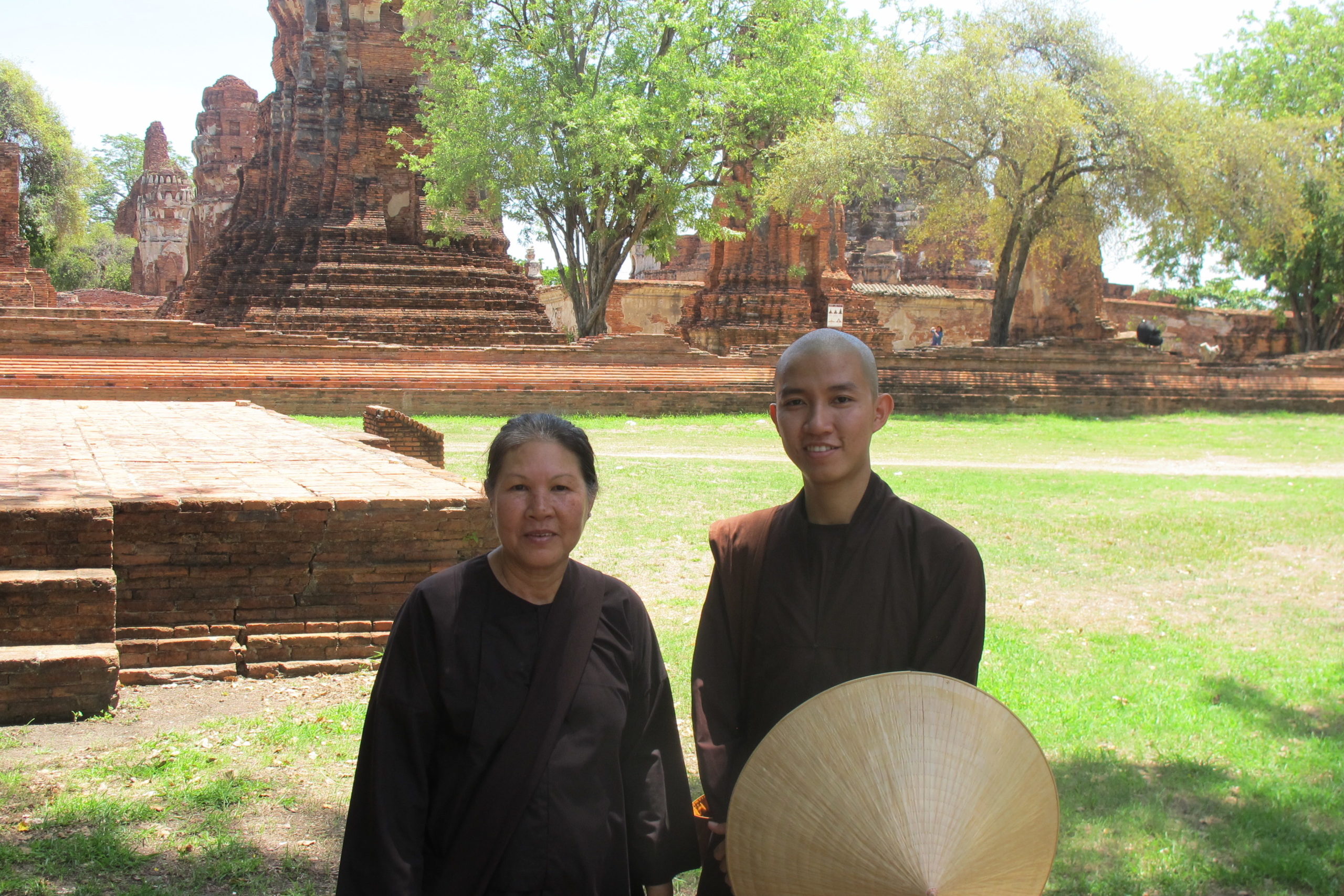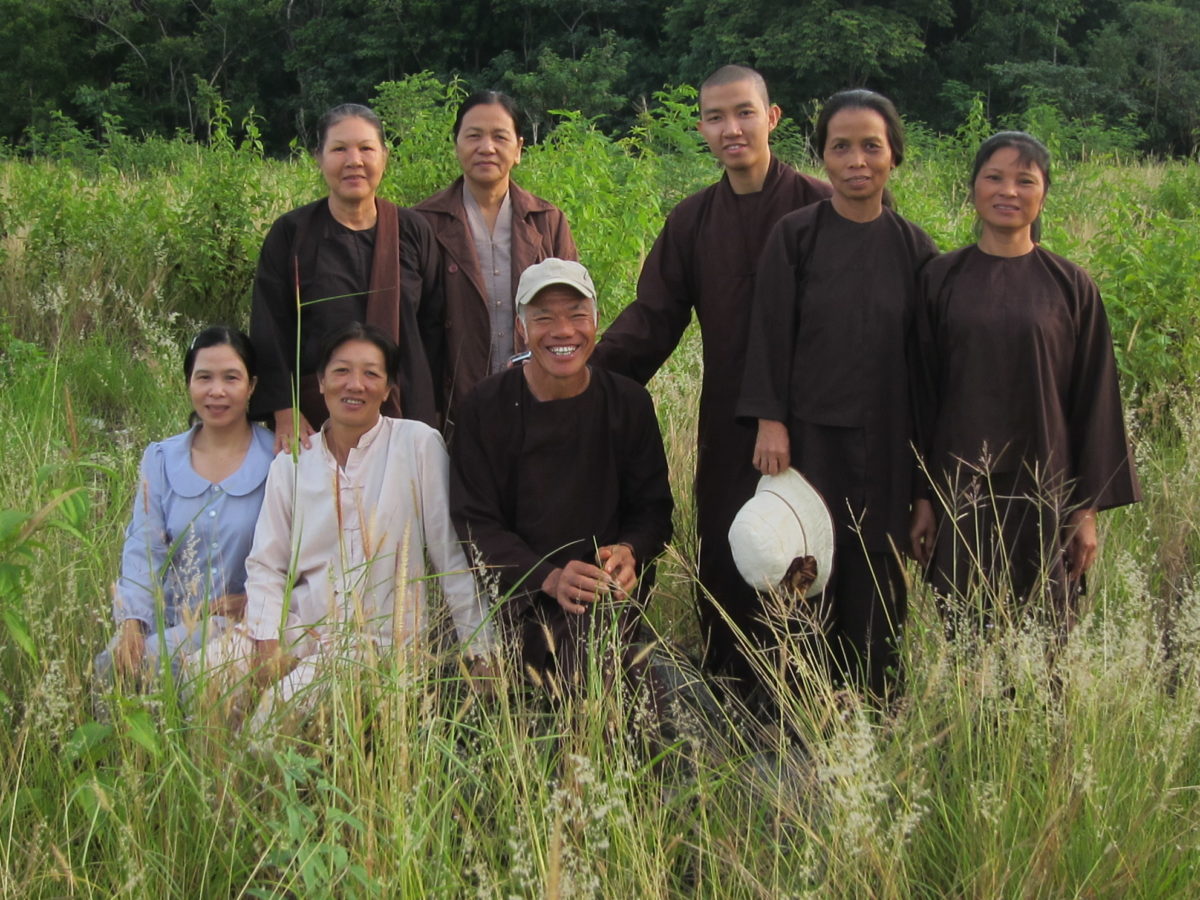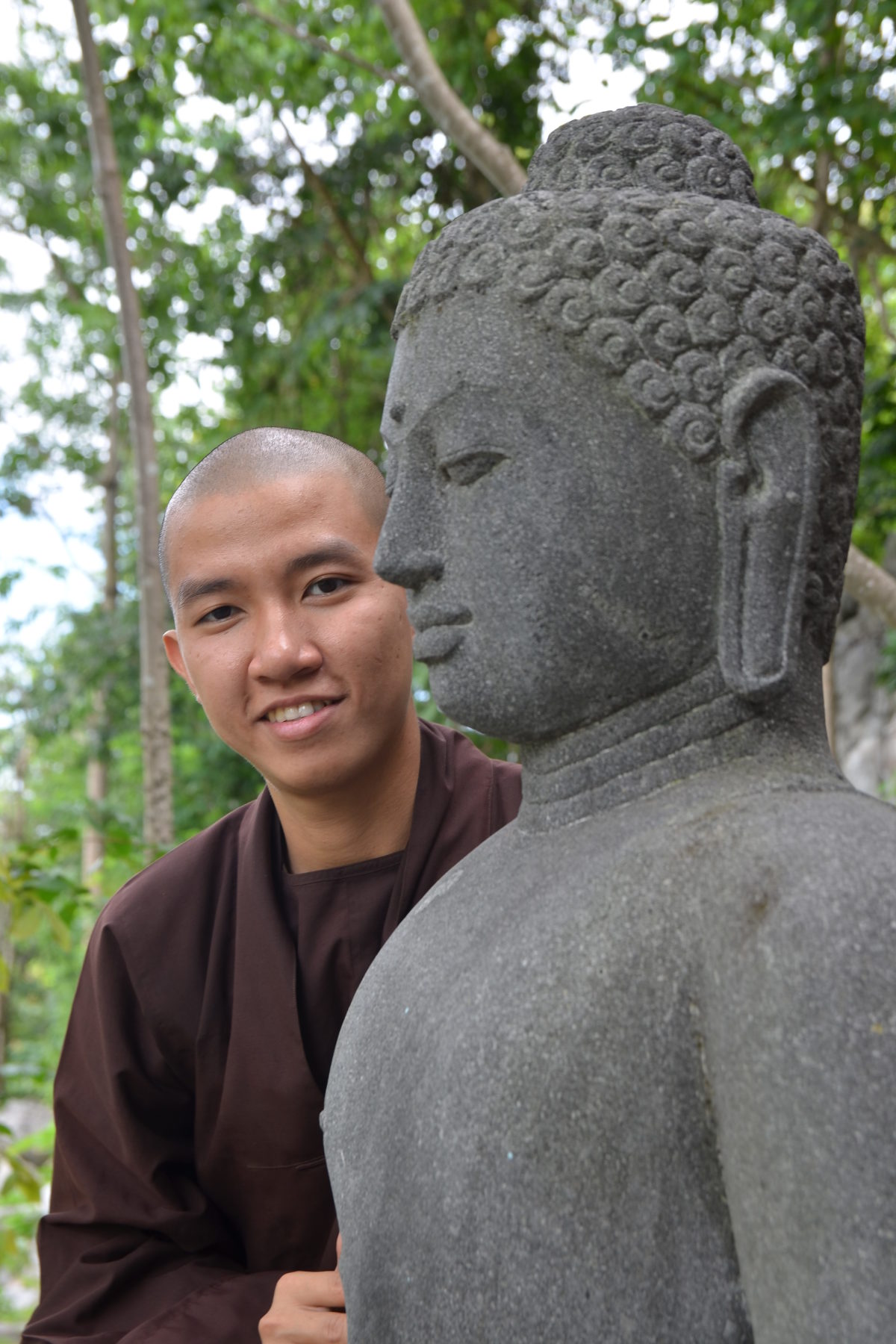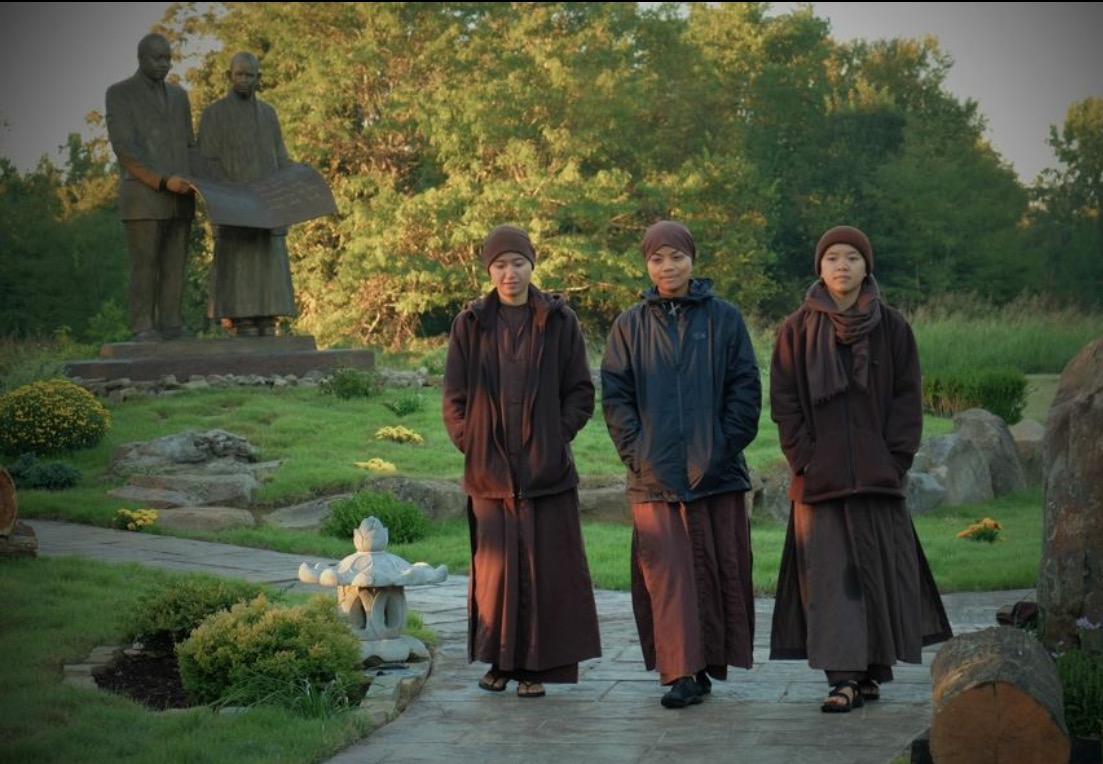Continuing My Mom’s Dream
By Brother True Communion

My mom visited me for twenty-six days during the 2015 teaching tour of the Plum Village Sangha International Delegation to Thailand. She was extremely happy learning the practice and being surrounded by many monks and nuns during her stay at Thai Plum Village.
She became a nun in the Khat Si Buddhist tradition in Vietnam at the age of sixteen.
Continuing My Mom’s Dream
By Brother True Communion

My mom visited me for twenty-six days during the 2015 teaching tour of the Plum Village Sangha International Delegation to Thailand. She was extremely happy learning the practice and being surrounded by many monks and nuns during her stay at Thai Plum Village.
She became a nun in the Khat Si Buddhist tradition in Vietnam at the age of sixteen. 1 After practicing as a nun for several years, she had to leave the monastic order. She wanted to continue living her life as a monastic, but the conditions at that time didn’t support her. When my parents met over thirty years ago, they fell in love with each other. It was a very strange context. My mom was taking care of my maternal grandfather, and my dad was taking care of my paternal grandfather. They both stayed in the same hospital, on the same floor, and my paternal grandfather rested in the bed next to my maternal grandfather’s bed. My parents’ love began there.
After getting married and then giving birth to my two elder sisters and me, my mom always wanted me to continue her dream of being a monastic and living in a good environment. When I was a little boy, she began encouraging me to continue her dream, to walk on this path, to become a monk. She often took me to Buddhist temples in our hometown, but they did not leave any strong impression on me. People around me were practicing a kind of devotion, which even now still continues. They come to the temple to do business with the Buddha. They may offer something, like bananas or oranges, to the Buddha, and ask the Buddha to grant their needs. They may pray, “Dear Buddha, please bless my family, give me happiness, give me success, give me power.” Many Buddhists are still doing that today. I felt there was something wrong with this kind of Buddhism when I was a teenager, but I did not know what it was. Most people nowadays tend to think of Buddhism as a kind of religion, by means of which they can pray and find refuge, not as something they can learn about and practice in order to change their lives. Thay, our beloved teacher, has many times shared that Buddhism is not only a religion but also an unlimited source of wisdom. But not many people can understand and see that. It is a great pity.
WE NEED A WAY TO TRANSFORM
My mom used to be a very strict and diligent practitioner of the Pure Land School. A practitioner of the Pure Land School is encouraged to invoke the name of Amitabha Buddha as often as possible and make a great vow to be born in the land of Amitabha Buddha, called Pure Land, after death. They consider the world they are living in very negative and impure. They want to leave this world as soon as possible in order to be born again in that land. They often give rise to the “mind that is weary of this world” where there is so much suffering. They think there is no suffering and there is only happiness in the Pure Land of the Buddha.
My mom tended to think that way before she knew the Plum Village practice. My mom visits the nearby Buddhist temple very regularly, supporting the monks by cooking or washing up in the kitchen with other lay members. Staying in the temple, she feels very happy and joyful, but when she returns home from the temple, she still suffers a lot. She may feel hurt and saddened by my drunken father’s unkind words and attitudes.
I was exactly the same as my mom is now. When I was learning about Buddhism at the age of fifteen, I was not taught how to transform my suffering and how to cultivate my happiness. Instead of learning ways to be happy myself, I was given a lot of advice to do good things. Many Dharma teachers in Vietnam, whom I learned from, shared that you should not get angry at others, you should not blame your wife, your husband, your son, your daughter—but I was never taught what to do, how to apply these teachings in my real life. We all know very well that getting angry at others, and blaming, judging, or criticizing others is not good; it might harm or destroy our relationships. But our habit energy is to blame, to judge, and to criticize. If we want to stop doing that, we need a practical way to really transform those negative habits. We need somebody to show us the way.
A CHANGING FAMILY
The first time I encountered Thay’s teachings was through the book Old Path White Clouds. That book has changed my life, my way of looking at the world, and my point of view concerning Buddhism, the Buddha himself, and his teachings. Fortunately, since I first became a novice monk, my family has been changing positively, and my mom has also begun to learn about Thay’s teachings. Many times I shared with her, on the phone, what I had learned with Thay, with the Sangha. She understood just a little bit, and she knew about the teachings of mindfulness but did not really put them into practice in her daily life.
Her visit to Thai Plum Village this year has changed her ways and her views of Plum Village. One day on the way from the dining hall to the washing-up area, she told me: “My dear son-brother, I really want to bring the practice here back home with me. What do you think?” I was extremely surprised and of course extremely happy too, because I didn’t expect that from her before she came here. Not knowing what to say at that moment, I kept silent for a while, and then addressed her, “That sounds so great, Mom. Are you kidding me? I will be so happy if you can do that, dear Mom.”
Then I asked her, “Why do you want to bring the practice back home?”
She replied, “Because it is so helpful for me. The practice here helps calm and settle me down.”
I asked her, “Can you give me an example?”
She responded, “The sounds of the bell help me a lot. When I hear the bell sounding, I stop and focus my attention on my in-breath and out-breath, then I slowly become calmer and more peaceful right in the present moment, and I drop all my worries. It’s so wonderful! I have never had that kind of feeling.”
After we finished washing our bowls, my mom and I went to the meditation hall for a long conversation. We sat on the first floor. She listened to me deeply. I shared with her so many things about my monastic life and about my wishes, but mostly my happiness and joy living in the community. That was my first conversation with her since she arrived at Thai Plum Village.

MANGO-PICKING MEDITATION
During this visit, there were also many moms and dads of other monastic brothers and sisters. They so enjoyed singing and being together all day long as the days passed. They became very connected and close to each other after just a few days. Most parents came about two weeks before the retreats, so we monastics had much time to enjoy being present with our parents. We went for a hike. We chatted. And we ate our meals together almost every day.
We even sometimes practiced mango-picking meditation together. In Thai Plum Village, we have quite a large mango orchard with hundreds of mango trees. The international Sangha’s arrival was exactly at the time when the mangoes ripened. All the fruits ripened perfectly during that month. Here, mangoes are grown without any pesticides. The fruits taste so good, fragrant, and delicious. Some people have shared that these are real mangoes, and they can smell the mangoes’ smell. They rarely find such good mangoes grown without pesticides in Vietnam. The monastics’ parents and relatives were all very happy, nourished, and healed.
My mom learned a lot of things during that period of time, especially in the Vietnamese retreat. She felt so moved and touched by the Dharma talks given by Sister Chan Khong (Sister True Emptiness), Thay Phap Dang, and other senior Dharma teachers. She also began to love the mindfulness songs of Plum Village, which formerly she totally disagreed with. “Why are monks and nuns here allowed to sing?” She had asked many times. She particularly loved Sister Chan Khong’s talk on the practice of Beginning Anew. She wanted to bring this practice back home.
Two days before her return to Vietnam, she invited me for another conversation on a very rainy afternoon, but this time, on the second floor of the meditation hall. We both faced the mountains, rolling hills, and rain outside. She started first as I sat next to her. With a very soft voice she began to share. The first thing she shared was her comments on my practice. I remember her first sentence exactly: “My dear son-brother, I’ve been observing your practice during the past three weeks, and now I would love to share with you before I leave here.” It seemed like she was practicing “Shining Light” on me. She started with the very first step, which was recognizing the “lotus points” in me, and then the “mud points,” and of course her last step was to give advice on how to transform those mud points into lotus flowers in order for everybody to benefit.
Sitting there, I practiced the vows of the Bodhisattva Avalo-kiteshvara; I listened to her without judging, reacting, or prejudice. With my whole being, I listened deeply to her feelings, her new viewpoints, and especially her aspiration in the practice. After listening deeply, I kept silent for a while and then began to talk. I expressed my gratitude to her for being such a good and kind mom in my life, because it is not so common to have somebody who loves us and gives us comments on our life in a very kind and loving way of sharing. Her observation on my practice demonstrated that she does love her son very much. It showed that she always wants her son to be a good monk, a useful person in this world, who can help and benefit all other living beings. She had not learned the practice of “Shining Light” yet, but she did it very well that rainy afternoon.
BRINGING THE PRACTICE HOME
I shared with her how to bring the practice back home. I just suggested some simple steps and practices that she could easily apply at home, which is a totally different environment from a monastery. I asked her, “In the temple you often go to, is there anyone who can teach you how to solve your problems at home?” She shortly replied, “No.” I encouraged her to create a Pure Land of the Buddha right in our family, not just to pray for the Pure Land in the future. I shared, “Mom, you should practice in such a way that you can smile and be peaceful at home, whenever Dad gets drunk and says unkind words to you. When you are able to smile in a difficult moment like that, then the Pure Land will manifest right away for you.” She agreed with me. She promised me that she would try her best to put the teachings into practice as much as she could. I also promised her that I would do my best to be a good monk so as to be worthy of receiving her love, care, and strong faith. We were both very delighted to end our second and last conversation during her visit to Thai Plum Village.
Several decades ago, she did not want to leave the monastic order, but she had to. She did want to continue, but she couldn’t. If she had continued living as a nun, she would not have met that young man in the hospital and become his wife. If she had not married, I myself would have been something else and manifested in other forms of life. I can see clearly that I am now continuing her dream as a monastic. I am committed to bringing her with me along this path. I see that I am very fortunate to have discovered this path of mindfulness, and I think I could not be who I am now without her support, our beloved teacher, and the Sangha.
Thank you, Mom, for giving birth to me and raising me up.
Thank you, Thay, for bringing me to this spiritual life.
Thank you, Sangha, for cradling me and accepting me as your own child.
Your friend and your brother,
Brother True Communion
1 Khat Si: A monk of this tradition normally walks down the street on alms rounds every morning, begging for food. This Buddhist tradition is similar to Theravada Buddhism in Thailand. The monastics’ upper robes look the same. The only difference is that the monastics of Khat Si tradition eat a totally vegetarian diet. The food they are offered when going on alms rounds is also vegetarian.

Brother True Communion (Brother Linh Cam) was born in the southwest of Vietnam, Mekong Delta. After attending a Wake Up retreat for young people in Asia organized by Thai Plum Village in 2012, he went back to Vietnam and decided to become a monk. He had to let go of everything he had as a final-year student at a university in Saigon to train himself as an aspirant at a Buddhist temple called Tu Duc, which follows the Plum Village tradition. He was ordained by Thich Nhat Hanh on April 28, 2013. He is now residing at the Clear Sky Hamlet, Thai Plum Village International Meditation Practice Center.

